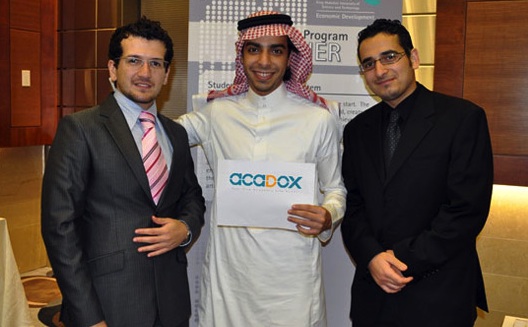Building a Learning Management System in Saudi Arabia: Acadox

 During our undergraduate studies in King Fahd
University of Petroleum and Minerals (KFUPM) we, Mohammad
Al-Hareeqi, and Nedal Mourad, and I, wanted an educational
experience that would help us learn in the same way we interact
with our world. Like other students, if we have a question,
we text, instant message a friend, or Google it. We learn on
our own terms and demand Web 2.0 or even 3.0 technologies.
Traditional course tools are increasingly irrelevant for today’s
students; instructors need new ways to engage their students in a
learning environment that puts the students in control and in touch
with each other. Learning should imitate life.
During our undergraduate studies in King Fahd
University of Petroleum and Minerals (KFUPM) we, Mohammad
Al-Hareeqi, and Nedal Mourad, and I, wanted an educational
experience that would help us learn in the same way we interact
with our world. Like other students, if we have a question,
we text, instant message a friend, or Google it. We learn on
our own terms and demand Web 2.0 or even 3.0 technologies.
Traditional course tools are increasingly irrelevant for today’s
students; instructors need new ways to engage their students in a
learning environment that puts the students in control and in touch
with each other. Learning should imitate life.
So we started an investigation to understand the major problems faced by students and professors to come up with ideas for making life easier for them. After several discussions, brainstorming sessions, user surveys, and fruitful interviews, we came up with the idea for “Acadox.” Because of study overload however, we didn’t immediately take our idea to the next level.
The Separation
After graduating, Mohammad went to work at SABIC, then CISCO, and finally the National Security Council. I worked at Saudi ARAMCO for a while, started a Master’s degree at that University of Manchester in the U.K., and then finished my degree in compute science at the King Abdullah University of Science of Technology (KAUST). Nedal also worked at Saudi ARAMCO and then began his master's degree at Stanford, also returning to finish at KAUST. After being separated, all three of us came back with three different experiences that eventually added value to our product.
Once we were back together studying at KAUST, a seed funding program was announced, and we met and decided to apply with the idea we had, a learning management platform to make students' lives easier. We contacted Mohammad and brought him back on the team, and then submitted our application. We were shortlisted in the first round, and ater pitching to a panel of judges, the project was accepted as one of the inaugural seed fund startups at KAUST in May 2010.
The Seed Fund Project Plan
We developed the business and technical plan for 3 months. To finalize the set of features, we created and tested a prototype, getting feedback from users and experts to determine which tools are the most useful.
After testing, we built a product that included an interactive course manager, a portfolio manage to allow students to document their process and build a CV, a data analysis platform for teachers, and a social community hub, where students can interact and share news, requests, questions, and concerns, all in Arabic.
The idea was to both support students by helping them maintain their documents in one place and give them a platform for showcasing their achievements, while providing teachers with a way to create interactive classes and understand their students better. Our overall vision included breaking down the wall between management and students at universities by providing smarter views and intelligent reports, while enriching their academic content.
Our goal was to first approach the Saudi market, which has over 49 universities and over 1000 institutes with 1 million students in higher education. We began by launching a pilot at KAUST’s Winter Enrichment Program, from mid-December 2011 to the end of January, during which Acadox was introduced to visitors from universities including MIT, Stanford, Texas A&M, Oxford, and KFUPM along with the KAUST community. We had 11,000 unique visitors from over 100 countries, and 179 courses were created on the platform.
In the future, we will approach the Middle Eastern market, which has over 15 million students and 500 universities, and eventually we hope to go global.
Lessons Learned
Some of our biggest challenges helped us to develop the product along the way. Here are some of issues we faced:
- Attracting good talent to work in our start-up
team. Team management is essential. We marketed our future
vision and passion for this project so that people would be part of
that vision, not just regular employees.
- Keeping up with the evolving technologies in web
development. To stay in touch with the cutting edge of
what’s available, we have to perform continuous research on today’s
solutions and ask experts in the field.
- Proving to customers that our solution can offer
advantages over existing platforms. We hosted meetings
with clients and implemented their feedback to demonstrate that we
are willing to execute to suit their needs.
- Gathering feedback from users and assessing what’s
important to implement. You can never make everyone happy,
but we incorporated elements that are compatible with our primary
vision. Pivoting, as we discover which elements are not used and
uncover new ones that are desperately needed, is a part of our
vision.
- Dealing with Financials. As tech guys, we have never dealt with accounting or finance. We are solving that issue by studying it and also asking people in the field. We listen and learn.
Our biggest advice to startups just starting out is to make connections, take calculated risks, question your assumptions, be ready to pivot, and always talk to customers. You will be amazed how much information you can gather by just a friendly chat.


